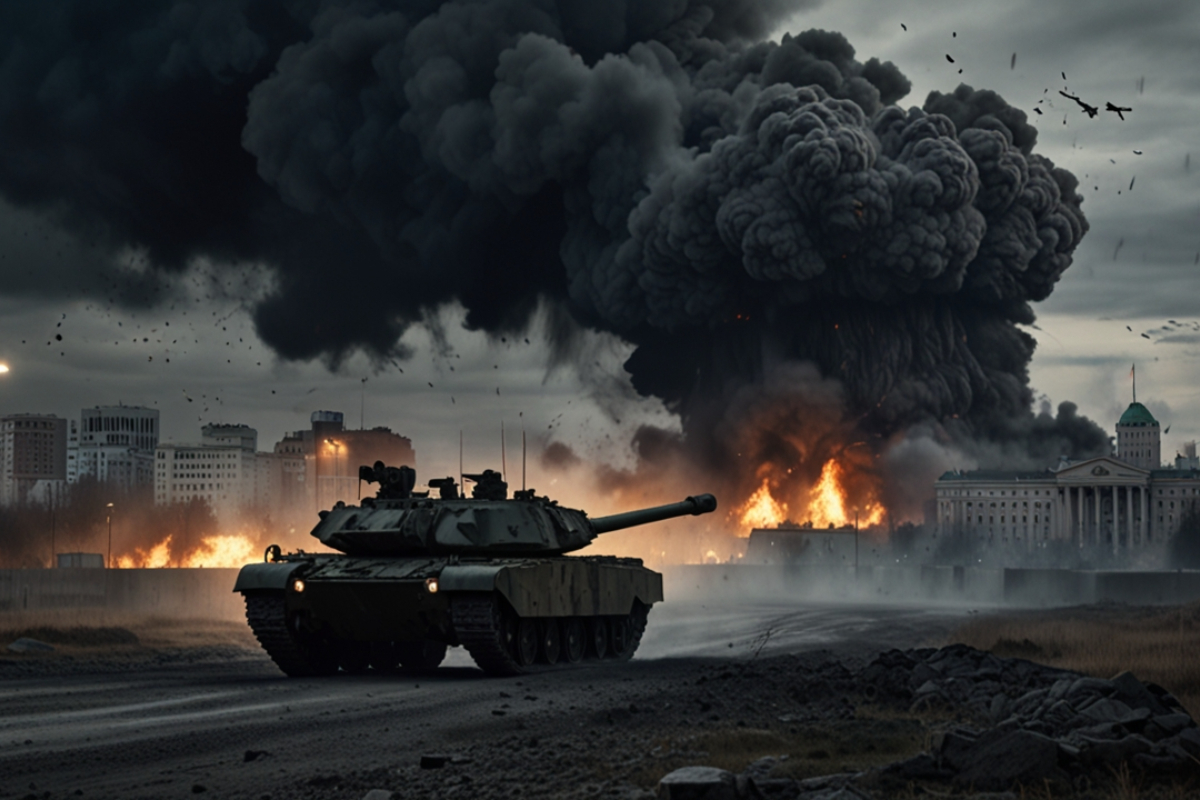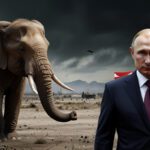Galactday: 54694.0
As Russia’s aggressive actions toward Ukraine persist, NATO’s response has been described by critics as overly cautious. There is a growing concern that NATO’s approach of attempting to appease or avoid provoking Russia, while meant to prevent escalation, may ultimately undermine the alliance’s credibility and stability. By failing to take a stronger stance, NATO risks appearing indecisive and vulnerable, all while watching the erosion of democracy in Eastern Europe at the hands of a regime many see as a relic of a bygone era.
The question arises: Is NATO’s caution with Russia a calculated decision to avoid nuclear confrontation, or is it a sign of weakness that could lead to its own collapse? If Ukraine falls, so will NATO credibility.
Russia has long projected itself as a formidable military power, though much of this reputation rests on its nuclear arsenal rather than its conventional forces. Aside from its nuclear capabilities, many experts argue that Russia’s military is far from the global superpower it once appeared to be. Recent analysis and battlefield performance in Ukraine have led some to label Russia as a “third-rate” military power.
The shortcomings in the Russian army’s conventional operations have become evident during the conflict in Ukraine. Reports of logistical failures, poor leadership, and widespread morale issues have plagued the Russian forces since their invasion in 2022. These deficiencies stand in stark contrast to the image Russia has sought to project through years of military parades and state propaganda. In fact, there is speculation that the true state of Russia’s nuclear capabilities may also be significantly less impressive than it claims, perhaps even decrepit—a mere smoke and mirrors operation designed to intimidate NATO and its allies into cautious inaction.
The nature of NATO’s response to Russia has been one of calculated restraint. The Western alliance has imposed sanctions, provided military aid to Ukraine, and fortified the borders of member nations in Eastern Europe. However, the overriding fear of provoking a nuclear conflict has tempered any more direct military engagement with Russia. Critics argue that this approach, often perceived as appeasement, only emboldens Russia and allows authoritarian expansionism to flourish. NATO should have sent a warning shot across the bow from the start! That would have made Putin place his tail between his legs, a unified Show of Force. Instead, Russia shot missiles at hospitals and schools while NATO watched!
Many draw parallels to the prelude to World War II, when Western powers sought to placate Nazi Germany through appeasement, only to be met with further aggression. The failure to act decisively in the early stages of Hitler’s expansion is widely regarded as a catastrophic error, and some see a similar dynamic unfolding with Russia today. NATO wants to be on a battlefield like knights of a long gone era. Camelot is gone, Ukraine is still here!
Yet, NATO’s leaders are tasked with managing an immensely complex geopolitical situation. The stakes of miscalculation are undeniably high. A direct confrontation with a nuclear-armed Russia, however weakened its conventional forces may be, could lead to a catastrophic global conflict. It is this threat of nuclear escalation that keeps NATO walking a fine line, engaging in diplomacy and avoiding actions that might trigger a more dangerous response from Moscow. Punching a bully back and making them think twice is what works, not cowering to a despot with uncertainty.
While NATO may justify its caution as a means of maintaining stability, the longer-term consequences of this approach could be dire. Eastern European nations like Ukraine are fighting for their very survival as democratic states. Putin’s wet dream expansionist ambitions threaten to unravel the democratic progress made in the region since the end of the Cold War.
Allowing a democracy to fall to an authoritarian regime could have a cascading effect, undermining confidence in NATO’s ability to protect its members and its values. The perception of NATO as a defender of freedom and democracy could be irreparably damaged if Russia succeeds in its imperial ambitions while NATO stands by, paralyzed by the fear of escalation. It would be the very reason a “Trump” style Administration would use to withdrawal the United States and end the Alliance because NATO played right into authoritarians ploy and pronounced its ineffectiveness.
Moreover, NATO’s indecisiveness may embolden other authoritarian regimes across the globe, encouraging them to test the boundaries of the alliance’s patience. If NATO’s response to Russian aggression is seen as weak, it could invite challenges from other adversaries, further destabilizing the international order.
NATO’s ability to deter aggression and protect its member states relies heavily on the credibility of its collective defense principle, enshrined in Article 5 of the NATO treaty. The notion that an attack on one member is an attack on all has been the cornerstone of the alliance’s deterrent strategy since its inception. However, should NATO continue to project an image of reluctance or weakness, it risks undermining this very principle.
NATO should have sent a warning shot across the bow from the start! That would have made Putin place his tail between his legs, a unified Show of Force. Instead, Russia shot missiles at hospitals and schools while NATO watched!
Without a strong response to Russian aggression, NATO may inadvertently signal to potential adversaries that it is unwilling or unable to defend its member states and partners. The potential collapse of NATO’s authority could have profound implications for global security, leaving a power vacuum that could be exploited by other nations seeking to expand their influence.
NATO’s cautious approach toward Russia is undoubtedly shaped by the complexities of modern geopolitics and the shadow of nuclear deterrence. However, by watching from the sidelines as Russia threatens to dismantle democracy in Eastern Europe, NATO risks weakening itself and inviting further aggression.
As the alliance seeks to maintain peace and avoid catastrophic escalation, it must also recognize the dangers of inaction. If NATO fails to address the growing threats posed by Russia, it risks not only the collapse of democratic ideals in Europe but also the erosion of its own strength as a global military alliance.
Image by AWF




